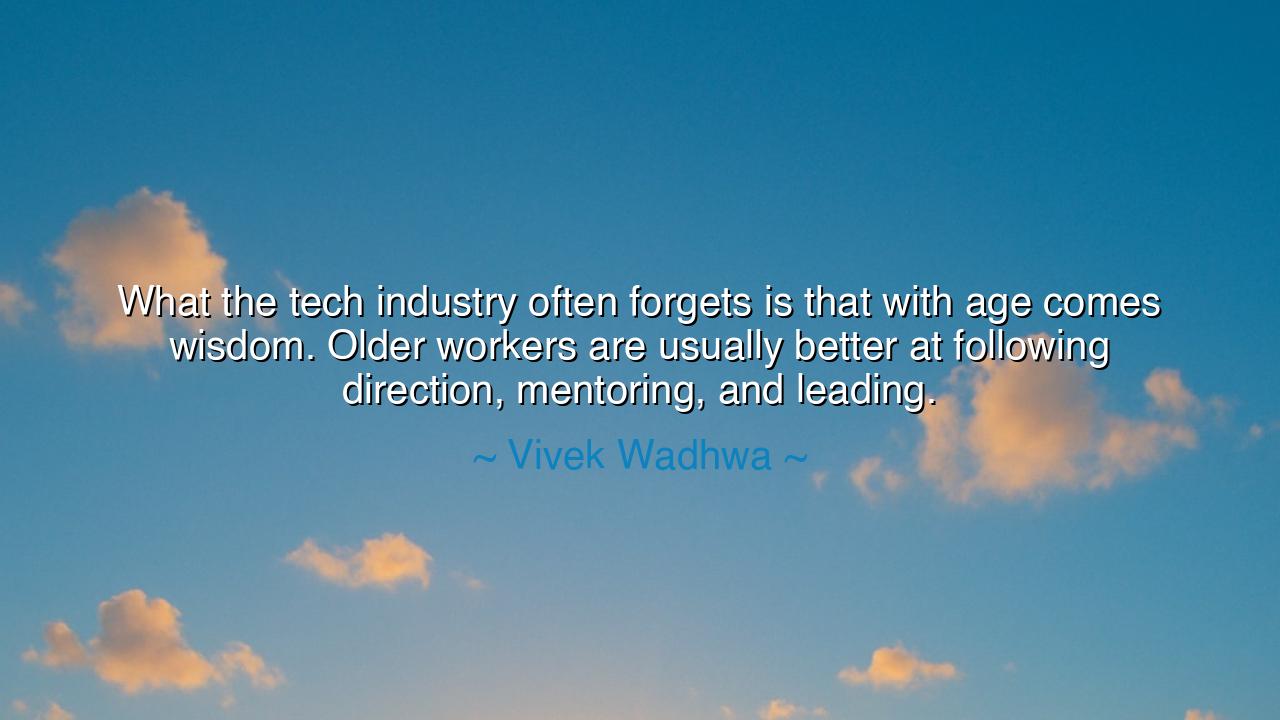
What the tech industry often forgets is that with age comes
What the tech industry often forgets is that with age comes wisdom. Older workers are usually better at following direction, mentoring, and leading.






"What the tech industry often forgets is that with age comes wisdom. Older workers are usually better at following direction, mentoring, and leading." These words, spoken by Vivek Wadhwa, carry with them a profound truth that resonates beyond the confines of the tech world and echoes through all facets of life. In this reflection, Wadhwa speaks to the undervaluation of experience—the tendency to prioritize youth and innovation over the wisdom and depth that age brings. In a rapidly changing world, particularly in the realm of technology, the temptation is often to discard the lessons of the past in favor of the bright, shiny future. Yet, Wadhwa reminds us that age does not simply bring years but insight, a nuanced understanding of the world that youth alone cannot always provide.
In the tech industry, where the race for the next big idea often blinds us to the value of experience, the older worker is frequently cast aside, replaced by younger, more technologically adept individuals. Yet, as Wadhwa rightly points out, age is not a hindrance to progress; rather, it is the foundation upon which true leadership is built. The older worker, seasoned by years of trial and error, is uniquely positioned to offer not only technical expertise but the kind of emotional intelligence, patience, and wisdom that fosters growth in others. These individuals are often far better at mentoring, guiding the next generation, and leading with a steady hand—qualities that cannot be measured in lines of code or innovative products alone.
Take, for instance, the great strategist and general, Sun Tzu, who, in his later years, composed The Art of War, a text still revered for its timeless wisdom on leadership, strategy, and conflict. While he may have been physically older than many of his contemporaries, it was his vast experience—gained through years of military campaigns—that made him one of the most revered minds in history. His wisdom did not stem from theoretical knowledge but from a lifetime of real-world experience. Just as Sun Tzu’s insights into leadership and strategy have endured, so too does the wisdom of those who have lived through the challenges of life. Experience shapes us, teaches us humility, and imbues us with a sense of clarity that cannot be replicated by the youthful rush of ambition.
This is not to say that youth does not have its own strengths. The enthusiasm, creativity, and energy of younger generations are vital to the forward motion of any industry. But it is crucial that we do not fall into the trap of seeing age as a limitation, for it is precisely in the marriage of youthful energy and seasoned experience that true innovation occurs. The older worker, having weathered the storms of past mistakes, is often better equipped to navigate the complexities of leadership. Their ability to follow direction, offer guidance, and help others grow is rooted in the patience that comes only with age.
Consider the life of Warren Buffett, the legendary investor who, in his later years, continues to lead one of the most successful financial empires in the world. Though he is in his nineties, his ability to mentor the next generation of investors, guide his company through tumultuous times, and remain an unwavering voice of reason has made him a beloved figure in the world of finance. His success is not merely a result of his financial acumen but of his ability to lead with wisdom, to understand the human side of business, and to impart lessons learned through decades of experience. In Buffett’s case, age has brought him not just financial success, but the ability to guide others to success as well.
The lesson here is powerful: wisdom cannot be rushed, nor can it be bought. It is earned over years of hard work, failure, and reflection. Older individuals are often better at handling the complexities of life and work because they have lived through them. They have faced challenges, made mistakes, and learned to overcome them. Young people may have ideas, but older individuals have insight—and it is this insight that is often the true driver of progress. Therefore, in the pursuit of innovation, let us remember the importance of mentorship and the invaluable role of the seasoned mind in any endeavor.
In practical terms, this means that we must begin to value the contributions of older workers, not just for their technical skills but for the wisdom they bring to the table. It is crucial to foster an environment where experience is seen as an asset, not an impediment to progress. In doing so, we create a more balanced, harmonious workplace where the strengths of all generations are respected and utilized to their fullest potential. Just as Sun Tzu’s teachings have stood the test of time, so too can the wisdom of older generations guide us toward a future where both youth and experience work in tandem, shaping a brighter, more sustainable world.
In conclusion, let us heed the words of Vivek Wadhwa and recognize that age is not a barrier to success, but a wellspring of wisdom. It is through mentorship, guidance, and leadership that we truly foster growth, and these qualities are often at their peak in those who have lived, learned, and grown over the years. Just as history has shown us the power of experience, so too must we ensure that we embrace it in the present, using it as a foundation for the future.






AAdministratorAdministrator
Welcome, honored guests. Please leave a comment, we will respond soon